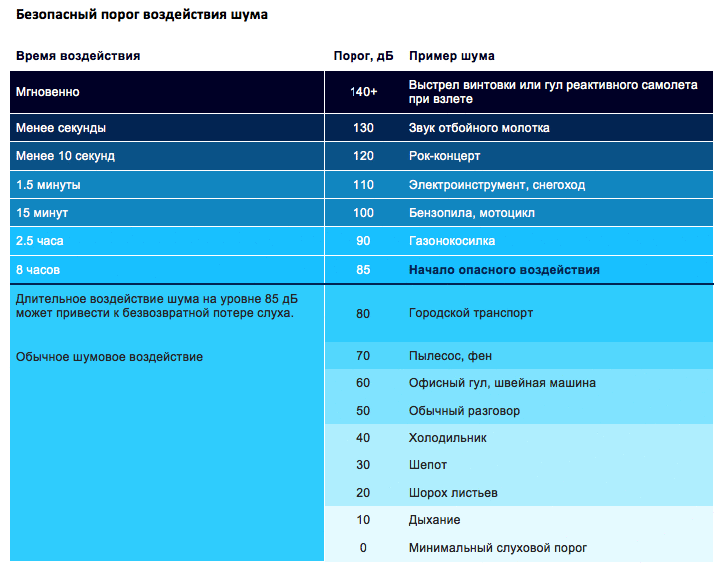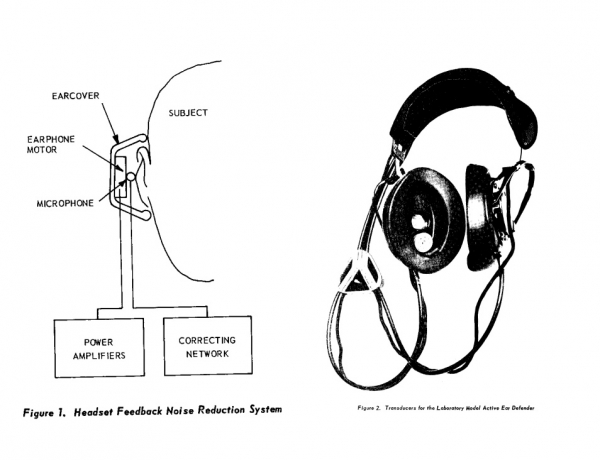How the US Department of Defense protects the ears of soldiers
According to statistics from the US Department of Defense, more than half of veterans who have returned from Iraq or Afghanistan suffer from various hearing impairments. This is a serious problem for the military, which the Ministry wants to solve with the help of technical means. Soldiers experience a “tactical communications and defense system” - the Tactical Communication and Protective System, or TCAPS.

Sergeant Jesse Bacon uses the Tactical Communications and Protective System (TCAPS).
Loud sounds can cause mechanical damage to the organ of hearing. Some professions suggest the constant impact of such sounds - for example, musicians, pilots, road workers and the military. Special systems are being developed for them to reduce the level of danger during work. Below is a table showing what sounds and in what quantity can negatively affect your ears.

')
The history of special headphones for musicians began in 1987, when Etymotic invited Westone to jointly develop headphones for musicians to protect their ears. These headphones are made on the cast of the ear, so that they are ideally suited to the owner. In 1995, Alex Van Halen did not hear behind the drum set that other band members were playing, and therefore the band’s sound engineer assembled two-driver headphones capable of blocking noise and producing a sufficiently high-quality sound. This is how Ultimate Ears was born - by 1998, their customers were The Rolling Stones, Enrique Iglesias and Red Hot Chili Peppers.
The buzz from the take-off of a jet aircraft can deprive a person of hearing, so such devices are especially important for pilots. They use systems like ACCES (Attenuating Custom Communications Earpiece System), called consonantly with the English word "Aces" - "Aces". These headphones protect your hearing, let you hear your colleagues, and provide pressure stabilization.
Headphones with protection from external sounds began to develop in 1959 - they were described by Willard Mikker. Twenty years after that, Amar Bowes, the founder of Bose, began working on ANC - active noise cancellation, an active noise cancellation system. The goal was to create headphones that would allow passengers on the plane to enjoy the music and not hear the engine noise or the cry of the children. First of all, Bowes used such a system in the headset for pilots who now often fly in headphones from Bose and Westone.

During work "in the field" soldiers, it is important to preserve the hearing, which may be affected by equipment, shots, explosions. At the same time, they need to hear what is happening around - and not only what is transmitted by radio, as is the case with pilots. It is important to hear any whisper, any steps behind your back, a soft creaking opening door - even when bullets are flying around and shells explode.
Soldiers for such conditions need "smart" headphones. Since 2012, the US Army has been using the latest version of a hearing protection system for soldiers, which protects ears from loud noises, while at the same time allowing them to hear quiet ones.
Doug Brunhart of the main US Army Medical Center — the Walter Reed Army Medical Center — says technology is not very sophisticated. The TCAPS system consists of a pair of in-ear headphones, microphones and a main unit, mounted on clothing. Some models allow you to communicate with the communications equipment of the soldier.

The system automatically controls the volume of incoming sounds from outside. The louder the sound, the more TCAPS lowers the volume. The soldier continues to hear everything, but loud noises do no harm. Likewise, the volume of soft sounds is increased. On Youtube there is a video describing the system.
On the one hand, the system performs important work. On the other hand, it will be difficult for a person to start using it from scratch: time is needed for adaptation, for training. When the headset muffles the sound, it becomes more difficult to determine how close the explosion occurred.
Today, “active headphones” of this type from various manufacturers are used not only by the military, but also by hunters, shooting and airsoft fans. Some of them allow the owner to understand which side the sound comes from.

Captain Jennifer Noetze, an audiologist, helps the soldier install the system. year 2012.
The Pentagon knows that over the past four years, about 20,000 TCAPS devices have been brought into the army, but they have no information on how often soldiers use them in combat conditions. According to Brungart, the servicemen fear any things that might limit their hearing on the battlefield. Therefore, the system continues to refine, so that it "allows you to hear everything that a soldier needs to hear."
More than half of the soldiers returning from Iraq or Afghanistan have hearing problems. The use of such a device according to the developers should affect this situation.
Do you use “active headphones” for shooting or sports? Tell us about your experience.

Sergeant Jesse Bacon uses the Tactical Communications and Protective System (TCAPS).
Loud sounds can cause mechanical damage to the organ of hearing. Some professions suggest the constant impact of such sounds - for example, musicians, pilots, road workers and the military. Special systems are being developed for them to reduce the level of danger during work. Below is a table showing what sounds and in what quantity can negatively affect your ears.

')
The history of special headphones for musicians began in 1987, when Etymotic invited Westone to jointly develop headphones for musicians to protect their ears. These headphones are made on the cast of the ear, so that they are ideally suited to the owner. In 1995, Alex Van Halen did not hear behind the drum set that other band members were playing, and therefore the band’s sound engineer assembled two-driver headphones capable of blocking noise and producing a sufficiently high-quality sound. This is how Ultimate Ears was born - by 1998, their customers were The Rolling Stones, Enrique Iglesias and Red Hot Chili Peppers.
The buzz from the take-off of a jet aircraft can deprive a person of hearing, so such devices are especially important for pilots. They use systems like ACCES (Attenuating Custom Communications Earpiece System), called consonantly with the English word "Aces" - "Aces". These headphones protect your hearing, let you hear your colleagues, and provide pressure stabilization.
Headphones with protection from external sounds began to develop in 1959 - they were described by Willard Mikker. Twenty years after that, Amar Bowes, the founder of Bose, began working on ANC - active noise cancellation, an active noise cancellation system. The goal was to create headphones that would allow passengers on the plane to enjoy the music and not hear the engine noise or the cry of the children. First of all, Bowes used such a system in the headset for pilots who now often fly in headphones from Bose and Westone.

During work "in the field" soldiers, it is important to preserve the hearing, which may be affected by equipment, shots, explosions. At the same time, they need to hear what is happening around - and not only what is transmitted by radio, as is the case with pilots. It is important to hear any whisper, any steps behind your back, a soft creaking opening door - even when bullets are flying around and shells explode.
Soldiers for such conditions need "smart" headphones. Since 2012, the US Army has been using the latest version of a hearing protection system for soldiers, which protects ears from loud noises, while at the same time allowing them to hear quiet ones.
Doug Brunhart of the main US Army Medical Center — the Walter Reed Army Medical Center — says technology is not very sophisticated. The TCAPS system consists of a pair of in-ear headphones, microphones and a main unit, mounted on clothing. Some models allow you to communicate with the communications equipment of the soldier.

The system automatically controls the volume of incoming sounds from outside. The louder the sound, the more TCAPS lowers the volume. The soldier continues to hear everything, but loud noises do no harm. Likewise, the volume of soft sounds is increased. On Youtube there is a video describing the system.
On the one hand, the system performs important work. On the other hand, it will be difficult for a person to start using it from scratch: time is needed for adaptation, for training. When the headset muffles the sound, it becomes more difficult to determine how close the explosion occurred.
Today, “active headphones” of this type from various manufacturers are used not only by the military, but also by hunters, shooting and airsoft fans. Some of them allow the owner to understand which side the sound comes from.

Captain Jennifer Noetze, an audiologist, helps the soldier install the system. year 2012.
The Pentagon knows that over the past four years, about 20,000 TCAPS devices have been brought into the army, but they have no information on how often soldiers use them in combat conditions. According to Brungart, the servicemen fear any things that might limit their hearing on the battlefield. Therefore, the system continues to refine, so that it "allows you to hear everything that a soldier needs to hear."
More than half of the soldiers returning from Iraq or Afghanistan have hearing problems. The use of such a device according to the developers should affect this situation.
Do you use “active headphones” for shooting or sports? Tell us about your experience.
Source: https://habr.com/ru/post/394759/
All Articles